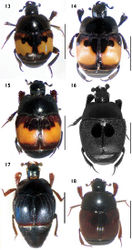Euspilotus richteri
| Notice: | This page is derived from the original publication listed below, whose author(s) should always be credited. Further contributors may edit and improve the content of this page and, consequently, need to be credited as well (see page history). Any assessment of factual correctness requires a careful review of the original article as well as of subsequent contributions.
If you are uncertain whether your planned contribution is correct or not, we suggest that you use the associated discussion page instead of editing the page directly. This page should be cited as follows (rationale):
Citation formats to copy and paste
BibTeX: @article{Aballay2013ZooKeys261, RIS/ Endnote: TY - JOUR Wikipedia/ Citizendium: <ref name="Aballay2013ZooKeys261">{{Citation See also the citation download page at the journal. |
Ordo: Coleoptera
Familia: Histeridae
Genus: Euspilotus
Name
Euspilotus richteri Lewis – Wikispecies link – Pensoft Profile
Diagnosis
Medium size (length: 2.3–3.8 mm, width: 2.1–3.4 mm). Body black, elytron with yellow or white spot. Pronotum with finer and sparse punctation, with a longitudinal lateral area on each side with coarse and dense punctation reaching the marginal stria, with two rows of large punctures on base. Pronotal hypomeron setose in dorsal view. Elytron with punctation coarse and dense on posterior half, finer and sparser on anterior half between intervals 2, 3 and 4; elytral dorsal striae 1–4 complete on anterior third, third stria sometimes reduced in basal area, fourth and sutural striae connected by a rounded arch; elytral spot with a digitiform projection towards apex, with two digitiform projections anterad, the outer one between the first and third dorsal elytral striae, the inner one between the fourth dorsal and sutural striae, sometimes between anterior margin, first and fourth dorsal striae and humerus with small yellow spots, making the anterior margin of the large elytral spot fuzzy. Pygidium: female with subapical groove V-shaped, male without grooves. Protibiae with outer margin expanded and 11–12 short, reddish denticles.
Distribution
Argentina, Chile and Paraguay (Mazur 2011[1]).
Taxon Treatment
- Aballay, F; Arriagada, G; Flores, G; Néstor D. Centeno, ; 2013: An illustrated key to and diagnoses of the species of Histeridae (Coleoptera) associated with decaying carcasses in Argentina ZooKeys, 261: 61-84. doi
Other References
- ↑ Mazur S (2011) A concise catalogue of the Histeridae (Insecta: Coleoptera). Warzaw University of Life Sciences, SGGW Press, 332 pp.
Images
|
